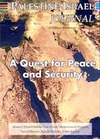Fadwa Touqan, who died on December 13, 2003, was the first lady of Palestinian literature. Born the same year as the Balfour Declaration was issued, Touqan lived through almost all the events that were to define the Palestinian nation and struggle, something she reflected so well in her poetry.
Much of her ouevre - whether about young stone throwers during the first Intifada or the pull of the land that leads a refugee to cross the border to reach his home in Jaffa, despite the knowledge that it will cost him his life - was political, as is the case of almost all Palestinian literature, and reflects the unavoidably political nature of what it means to be Palestinian.
Touqan was born, lived and died in Nablus. Though she traveled extensively in Europe, studied at Oxford University, and even wrote about London, a place "where one could become anonymous for a while," her poetry always reflected her roots. It was "enough for me to die on her earth... Enough for me to remain in my country's embrace."
The younger sister of another prominent poet, her first collection was dedicated to "My Brother Ibrahim" (1946) who kindled and encouraged her interest in poetry. The Nakba of 1948, with the displacement and dispossession of nearly two thirds of all Palestinians, and the evolution of the Palestinian struggle, provided Touqan with much of her inspiration as she described how the shock and humiliation gradually turned to summud, steadfastness, and resistance.
When the hurricane swelled and spread its deluge
of dark evil
onto the good green land
They gloated...
"The tree has fallen!"
...
Had the tree really fallen?
Never!
...
not while the red wine of our torn limbs
feed the thirsty roots,
Arab roots alive
tunneling deep, deep, into the land!
But Touqan also devoted much of her efforts to what she was in addition to being a Palestinian: a woman. The Nakba, with the influx of thousands of refugees from the sea-front cities, also brought with it a measure of liberation. "When the roof of Palestine fell," she wrote in her 1990 autobiography 'A Mountainous Journey,' "the veil fell off the face of Nablus women."
1948 was also the year Touqan's father died, a man who had demanded that she devote herself to political poetry. "How," she asked, could he ask that when "I am shut up within these walls? I don't sit with men, I don't listen to their heated discussions, nor do I participate in the turmoil of life outside. I'm still not even acquainted with the face of my own country as I was not allowed to travel."
Indeed, her early poetry was unique for its introversion and reflection, focusing, as it did, not on the struggle, but on her struggle as a woman. Achieving greater personal freedom thus allowed her greater involvement, and was a key factor in her political awareness and the acuteness of her poetry, as Palestine went from defeat to defeat.
1967 was another key moment, and as the Israeli occupation of Nablus became a reality, yet more grist was added to the mill. Checkpoints, humiliations at border points, house demolitions and the first Intifada all became new subjects reflected in her verse. The potency and the anger of her writing grew, and the combined themes of women's liberation and the liberation of Palestine reportedly led former Israeli Minister of Defense to exclaim that one Fadwa Touqan poem was the "equal of 20 commandos."
Touqan received the International Poetry Award in Palermo, Italy. She was awarded the Jerusalem Award for Culture and Arts by the PLO in 1990 and the United Arab Emirates Award in 1990. She also received the Honorary Palestine prize for poetry in 1996 and was the subject of a documentary film directed by novelist Liana Bader in 1999.
Touqan never married and had no children. She lived to be 86.
Enough for Me
Enough for me to die on her earth
be buried in her
to melt and vanish into her soil
then sprout forth as a flower
played with by a child from my country.
Enough for me to remain
in my country's embrace
to be in her close as a handful of dust
a sprig of grass
a flower.
The Wandering Dove
I wander everywhere, a frightened dove,
Displaced, denied, and deprived of love:
Snakes always coil to block my path,
Hissing, menacing, and full of wrath;
And hounds, chasing me, continue to bark,
So that my memory of love is pale, dark.
The images of my dreams are lost, worn,
And I always seem to tread on thorn!
Night has slaughtered my moon;
And in nightmares I writhe and swoon:
The Zionists robbed the stars of my night,
And nobody cares about my painful plight.
Ghosts tear my heart as I bitterly cry,
And the indifferent world never wipes my eye!
Freedom
My freedom
I shall carve the words in the
earth
chisel their sounds
over every door in the Levant...
below the slope at every street
corner inside the prison
within the torture chamber.

